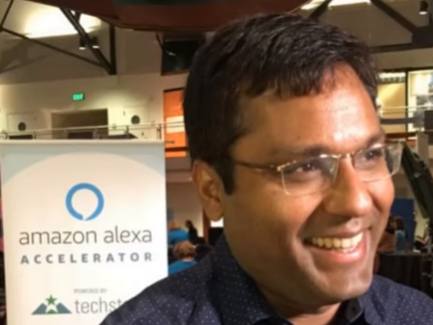| Amazon's Alexa Turns 5 |
| Written by Sue Gee | |||
| Wednesday, 06 November 2019 | |||
|
Amazon launched Alexa on November 6, 2014 which makes her 5 years old today. Thanks to developers, who have built more than 100,000 custom skills, Alexa is now capable of much more than playing music and providing timers and Amazon has established itself as the leader in voice-first technology. If you ask Alexa, "Who is your creator?" you'll receive the stock response "I was invented by Amazon". True enough but it's not the entire story. The two people who are credited as being Alexa's co-creators are Toni Reid, who oversees Alexa experiences and devices, and Rohit Prasad who is in charge of the speech and machine learning aspects. For Alexa's fith anniversary Rohit Prasad in his role as Alexa vice president and head scientist, posted Alexa at Five: Looking Back, Looking Forward based on a talk he had given at the Web Summit in Lisbon. One point that Prasad doesn't include in looking at how far Alexa has come in so short a time is that at launch the voice-controlled assistant was limited to 13 in-built skills. Instead he makes a much more positive pitch: In order to be magical at the launch of Echo, Alexa needed to be great at four fundamental AI tasks:
Over the past five years, we have continued to advance each of these foundational components. In both wake word and ASR, we’ve seen fourfold reductions in recognition errors. In NLU, the error reduction has been threefold — even though the range of utterances that NLU processes, and the range of actions Alexa can take, have both increased dramatically. And in listener studies ...we’ve seen an 80% reduction in the naturalness gap between Alexa’s speech and human speech. Explaining that that the overarching strategy for Alexa's AI has been to combine machine learning (ML) with the data and computational resources afforded by AWS, he goes to itemize four specific topics used to extend deep learning:
Looking at current work on Alexa, Prasad gives examples of how improvements are being incorporated into Alexa's ability ti coreect ASR and NLU errors by self-learning, i.e. with any human intervention. Another goal is to make Alexa more natural - including enabling her to handle compound requests, such as “Alexa, turn down the lights and play music”. A new approach to making Alexa more knowledgeable is Alexa Answers, which an online interface released last month after a private beta test, that lets customers add to Alexa’s knowledge and has already furnished hundreds of thousands of new answers. With regard to making Alexa's control of smart home devices more context aware and proactive an optional feature called Hunches already detects when lights, locks switches and plugs are not the "correct" state and suggests actions. A feature called Rotines is in the pipeline to detect and respond to patterns of user behavior. The example given in the blog post is: If you set your alarm for 6:00 a.m. every day and on waking, you immediately ask for the weather, Alexa will suggest creating a Routine that sets the weekday alarm to 6:00 and plays the weather report as soon as the alarm goes off. Finally Alexa's ability to respond is being improved by including the ability to carry context from from one request to another. For instance, if an Alexa customer asks, “When is The Addams Family playing at the Bijou?” and then follows up with the question “Is there a good Mexican restaurant near there?”, Alexa needs to know that “there” refers to the Bijou. Looking to what we can expect of Alexa in the near future Prasad notes: We are currently testing a new deep-learning-based technology, called Alexa Conversations, with a small group of skill developers who are using it to build high-quality multiturn experiences with minimal effort. The example he uses of a complex task that require back-and-forth interaction is of a customer using Alexa to plan a night out requiring different skills to find a movie, a restaurant near the theater, and a ride-sharing service, coordinating times and locations. At the moment this is clearly outside Alexa's competence. But looking at the progress made in Alexa's first 5 years it does seem entirely possible fairly soon.
More InformationAlexa at Five: Looking Back, Looking Forward Related ArticlesMicrosoft Adds Conversational AI Agents Over 100 Million Alexa Devices Sold To be informed about new articles on I Programmer, sign up for our weekly newsletter, subscribe to the RSS feed and follow us on Twitter, Facebook or Linkedin.
Comments
or email your comment to: comments@i-programmer.info |
|||
| Last Updated ( Wednesday, 06 November 2019 ) |




